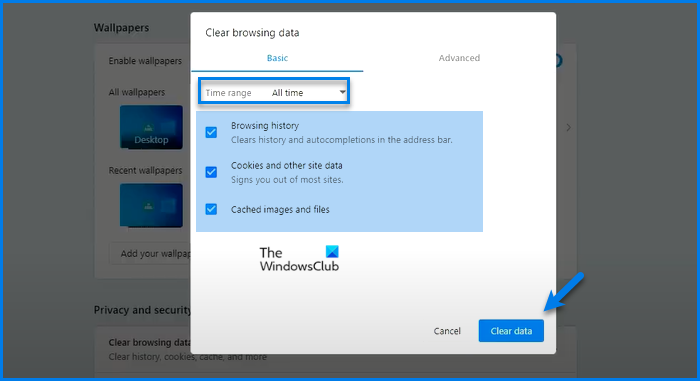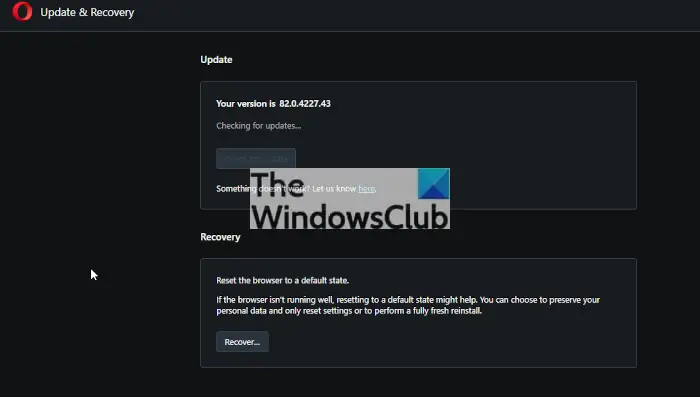Are you getting a black screen in your Opera browser now and then? This guide will help you fix the black screen issue in Opera. Opera is one of the most popular and versatile web browsers globally. While it works most of the time smoothly, it is not uncommon to run down into some annoying issues and problems. One of such issues is the black screen issue. Many Opera users have reported getting a black screen while working on the browser. If you are one of the affected users experiencing the same issue, this post is for you. You can try the fixes mentioned here if your Opera screen turns black.

Why am I getting a black screen in Opera?
There can be several reasons why you keep getting a black screen in your Opera browser. Here are some potential causes:
- One of the most common reasons for this issue is having an outdated and faulty graphics driver on your PC. Hence, if the scenario is applicable, you can try updating your graphics driver to fix the issue.
- It can also be caused if you are using an outdated version of Opera. So, make sure you have installed the most recent version of Opera to avoid such issues.
- The corrupted cache, cookies, and other browser data bulked up in your browser can also trigger the same issue. Hence, you can try clearing your browsing data in Opera to fix the problem.
- In case you have enabled the hardware acceleration feature in Opera, it can cause the same issue. So, disable hardware acceleration in Opera to resolve the issue.
- If the installation of the browse itself is corrupted, you are likely to experience the issue ta hand. In that case, reinstalling Opera should fix the issue for you.
Fix Opera Black Screen problems on Windows PC
Here are the solutions that you can try to fix the black screen issues in Opera on your Windows 11/10 PC:
- Restart your PC or browser
- Clear your browsing data.
- Update Opera.
- Make sure your GPU drivers are updated.
- Disable Hardware Acceleration.
- Enable JavaScript.
- Reinstall Opera.
Opera screen turns black
1] Restart your PC or browser
The problem might be caused by a temporary glitch with your browser or system. Hence, you can try relaunching your web browser and see if the black screen is gone or not. In case the problem remains, go ahead and try rebooting your PC and then launch Opera. If that works, well and good. However, if that doesn’t help, move on to the next potential fix to resolve it.
2] Clear your browsing data

Bulked-up and corrupted browsing data, including cache and cookies can be one of the reasons you are getting a black screen in Opera. Hence, you can try clearing cache and cookies in Opera and then see if the problem is resolved or not. You can follow the below steps to clear browsing data in the Opera web browser:
- Firstly, open Opera and press the Ctrl + H hotkey to open the History page.
- Now, click on the Clear Browsing Data button present in the upper right corner.
- Next, in the Clear browsing data window, set the Time range to All time.
- After that, enable the Cached images and files and Cookies and other site data check boxes.
- Lastly, press the Clear data button to clear up selected browsing data.
Once you are done deleting cache and cookies, relaunch Opera and check if the problem is fixed or not. If this method doesn’t give you any luck in getting rid of the issue at hand, try the next potential solution to fix it.
3] Update Opera

It is always recommended to keep your apps and browser updated to avoid issues like these. So, if you haven’t updated Opera in a while and are using an outdated version, update it right away and then check if the problem is resolved or not.
Here are the steps to update Opera on Windows:
- Firstly, start the Opera browser.
- Now, press the Opera menu button and then choose the Update and Recovery option from the appeared menu options.
- Next, click on the Check for Update button. Opera will now check for updates and if there is any update available, it will download them and install them.
- Once done, you can restart the Opera browser to let the changes take place.
After updating Opera, check if the black screen issue is gone or not. If not, you can go ahead and try the next potential fix to resolve it.
Read: Opera GX not opening on Windows.
2] Make sure your GPU drivers are updated
The next thing you should do is rule out the possibility of outdated graphics drivers causing the issue. As this issue could very well be facilitated due to out-of-date and faulty GPU drivers, ensure you have the latest version of Graphics drivers installed on your PC. So, update your graphics drivers and then try relaunching Opera to check whether or not the black screen issue is resolved.
You have multiple methods to update your graphics drivers on Windows 11/10 PC. Microsoft provides an Optional Updates feature that you can use to download and install driver updates. You can open the Settings app and move to the Windows Update tab. Then, click on Advanced options and you will find the Optional Updates option.
If you want, you can go to the official website of your device manufacturer to download the latest graphics driver installer. After that, you can run the installer and install the driver on your PC.
Once you are done updating your GPU driver, restart your PC and then try launching Opera to see if the black screen issue is fixed or not. If the problem persists, you can try the next potential solution to get rid of it.
See: Black Screen appears during Screen Share in Discord.
5] Disable Hardware Acceleration
If you have enabled the hardware acceleration feature in Opera, it might cause the black screen issue. Hence, try disabling hardware acceleration and then check if the issue is fixed or not. Here’s how to do that:
- Firstly, open Opera and click on the Opera menu button.
- Now, choose the Settings option.
- Next, expand the Advanced drop-down menu and click on the Browser option.
- After that, scroll down to the System section in the left-side panel and turn off the Use hardware acceleration when available toggle.
- Finally, relaunch Opera and see if the black screen problem has stopped now.
6] Enable JavaScript
You can also try enabling the JavaScript feature in Opera and check if it resolves the issue for you. Here are the steps to follow to do so:
- First, start Opera and tap on the Opera menu button.
- Now, click on Settings, and on the next page, type JavaScript in the search box.
- After that, from the search results, choose the JavaScript option and turn it on.
- Next, relaunch the browser and see if the problem is fixed or not.
7] Reinstall Opera
If none of the above solutions worked for you, the last resort is to reinstall your Opera web browser. This problem could be caused due to corrupted installation of your web browser. Hence, uninstalling Opera and then reinstalling it should help you fix the issue.
To uninstall Opera, open Settings using Win+I and go to the Apps > Installed apps section. Now, select Opera, click on the three-dot menu button associated with it and select the Uninstall option. Then, follow the prompted instructions to complete the uninstallation of the app. Once done, make sure to delete the installation directory of Opera from your system.
When Opera is uninstalled from your system, download it from the official website. And then, run its setup file to install it back on your PC. Hopefully, you won’t get the same issue again.
Why is Opera nothing loading?
If Opera is not loading on opening pages on your PC, it could be because of antivirus or firewall interferences. Hence, make sure to whitelist Opera through your firewall and antivirus to fix the issue. Apart from that, it can also be caused because of built-in ad-blocker and problematic extensions.
Why is Opera GX not working?
If Opera GX is not working for you, check your Microsoft Family settings. Apart from that, the corrupted settings and preferences associated with the browser can also cause the same. You can try resetting the app in that case. Also, the corrupted installation of the software can also cause the same. Hence, reinstall Opera GX and see if it works for you.
That’s it.
Now read: